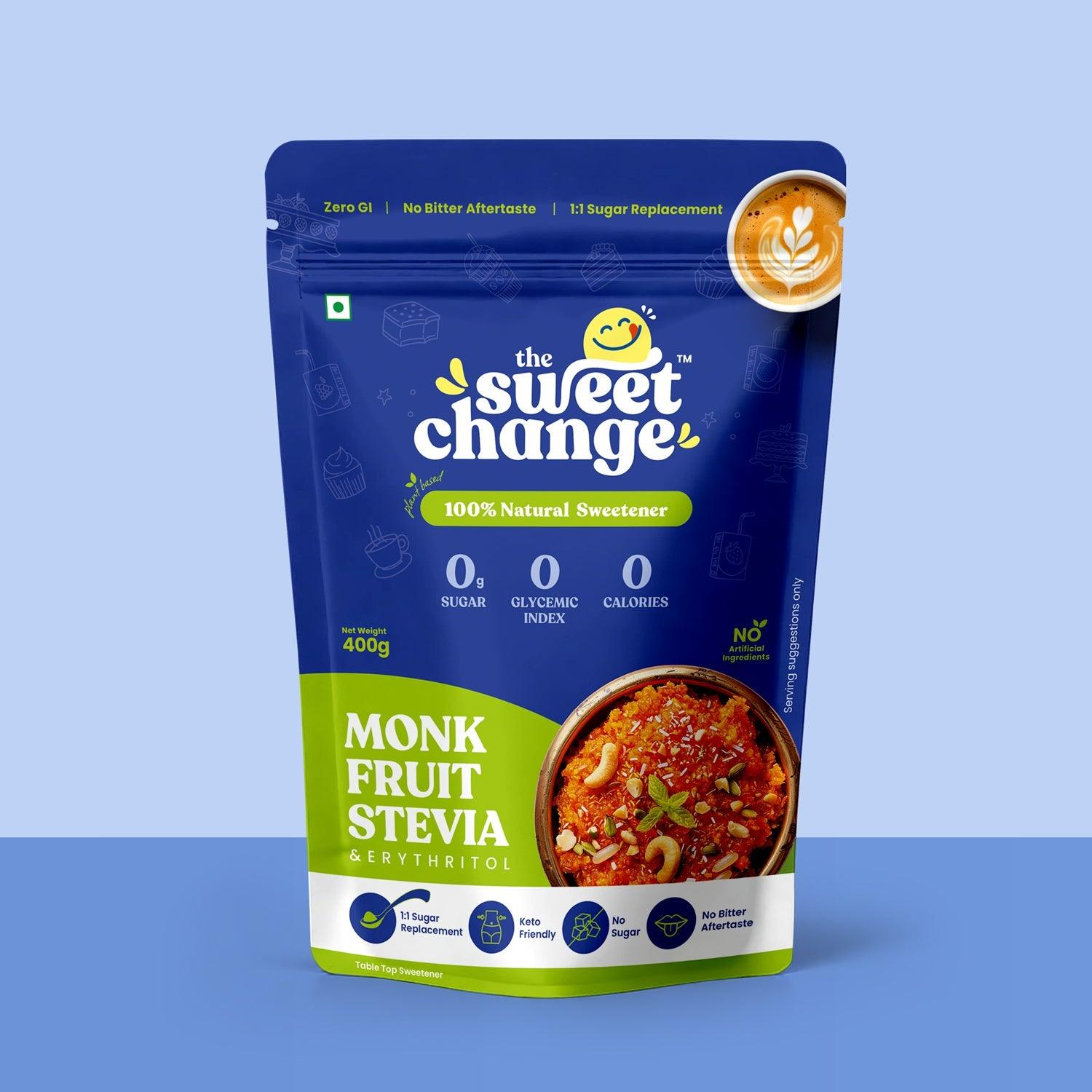
Monk Fruit Sweetener India | Zero-Calorie, Diabetic-Friendly Sugar
Share
Monk fruit sweetener is a natural, zero-calorie sweetener that is estimated to be 100 to 250 times sweeter than sugar. It contains no calories, no carbohydrates, and is thought to have antioxidant and anti-inflammatory properties. While monk fruit extract has been used for centuries in traditional medicine, its popularity has recently surged as it’s become more widely available as a healthy sugar substitute.
What is Monk Fruit Sweetener?
Monk fruit sweetener is derived from the monk fruit itself, also known as luo han guo or “Buddha fruit.” This small, round fruit is grown in Southeast Asia, particularly in China and Thailand. Monk fruit has long been used in traditional Chinese medicine for its healing and cooling properties.
Today, monk fruit sweetener is recognized by the Food and Drug Administration (FDA) and classified as Generally Recognized as Safe (GRAS), making it an approved option for daily consumption.
How Is Monk Fruit Sweetener Made?
To create monk fruit sweetener, the seeds and skin of the fruit are removed. The fruit pulp is then crushed to extract juice, which is filtered and dried into a concentrated powder.
It’s important to note that the natural sugars in monk fruit are not responsible for its sweetness. The intense sweetness comes from powerful antioxidant compounds called mogrosides, particularly mogroside V. During processing, mogrosides are isolated from the juice and refined into an extract that delivers natural, intense sweetness.
Because monk fruit extract can be extremely sweet, manufacturers often blend monk fruit sweetener with other natural ingredients such as erythritol or inulin to make it easier to use and more palatable. These blends offer a sugar-like texture and 1:1 sweetness ratio for easier substitution in recipes.
Why Is Monk Fruit a Popular Sugar Substitute?
Monk fruit is gaining popularity as a healthy alternative to sugar for several key reasons:
-
Zero calories
-
Does not raise blood glucose levels
-
Low-glycemic index
-
Suitable for people with diabetes
-
Keto-friendly and low-carb
-
No known side effects
- Natural origin with antioxidant potential
What Are the Benefits of Monk Fruit Sweetener?
Monk fruit sweetener offers several health and wellness advantages, especially for individuals seeking a natural sugar substitute or those following low-carb, keto, or diabetes-friendly diets.
Key Benefits of Monk Fruit:
-
Supports Blood Sugar Management: Monk fruit sweeteners do not impact blood sugar levels, making them ideal for people with diabetes or those managing insulin resistance.
-
Promotes Weight Loss With zero calories and zero carbohydrates, monk fruit is a smart choice for individuals focused on weight management or calorie-controlled diets.
-
Non-Toxic Unlike many artificial sweeteners such as aspartame or sucralose, monk fruit extract has no known side effects and is considered safe by the FDA (GRAS status).
-
Safe Safe for children, pregnant women, and breastfeeding mothers, monk fruit is a natural sweetener suitable for the whole family.
-
Powerful Antioxidant A 2009 study found that monk fruit gets its intense sweetness from antioxidants called mogrosides, particularly mogroside V. These compounds have been linked to low-glycemic effects.
-
Anti-Inflammatory Properties In a 2013 study, mogrosides were shown to help reduce oxidative stress, a key factor that contributes to aging and chronic diseases.
What’s So Great About Monk Fruit Sweetener?
Monk fruit sweetener is made from the extract of dried monk fruit, a small round fruit native to Southeast Asia. The extract is 150–250 times sweeter than table sugar, yet it contains zero calories, zero carbohydrates, and does not raise blood glucose levels—making it an ideal natural sugar substitute for people with diabetes or those on low-carb or keto diets.
Fewer Side Effects Than Other Sweeteners
Unlike many nonnutritive sweeteners that may cause gas, bloating, or allergic reactions, monk fruit extract is well-tolerated by most individuals. Artificial sweeteners like aspartame and sucralose often face controversy over potential side effects, but monk fruit has no known adverse effects to date.
The U.S. Food and Drug Administration (FDA) has designated monk fruit extract as “Generally Recognized as Safe (GRAS)”, even for pregnant women, children, and those with health conditions. However, because monk fruit is still relatively new to the global market, long-term studies in humans are limited. Moderation is always recommended.
Monk Fruit vs Refined Sugar
Monk fruit may offer numerous health benefits over refined sugar:
-
It may support healthy blood pressure and blood sugar management.
-
It contains zero fructose and is free of calories, making it useful for those managing obesity, insulin resistance, or PCOS.
-
It’s a natural sweetener with antioxidant properties, making it a healthier alternative for everyday use.
Antioxidant & Anti-Inflammatory Properties
Monk fruit contains mogrosides—natural compounds known for their antioxidant and anti-inflammatory effects. Studies suggest mogrosides help:
-
Inhibit oxidative stress, which may protect against DNA damage
-
Reduce inflammatory markers, lowering the risk of chronic diseases
Although more human studies are needed, existing research indicates monk fruit could play a role in reducing inflammation and cellular damage.
Monk Fruit for Weight Management
Because it contains zero calories, monk fruit sweetener is commonly used in weight loss diets. While no direct studies have measured its effect on body weight, research on other low-calorie sweeteners shows promising results for calorie reduction and appetite control.
Other Potential Health Benefits of Monk Fruit
-
Antioxidant Effects: Mogrosides fight free radicals and reduce oxidative stress.
-
Anticancer Potential: A 2022 study on mice found mogrosides suppressed lung cancer cell growth. However, human studies are needed for conclusive evidence.
- Antidiabetic Properties: Monk fruit has zero glycemic impact, making it suitable for people with type 2 diabetes.A 2019 rat study showed that mogroside improved fasting glucose levels and insulin sensitivity—though again, more human-based trials are required.
Is Monk Fruit Sweetener Safe?
Yes, monk fruit is generally considered safe. It’s been FDA-approved (GRAS certified) and is free from known harmful effects. However, because it’s a relatively new product in the global marketplace, and long-term human studies are still limited, it’s wise to use it in moderation, as you would with any sweetener.
What About Other Natural Sugar Substitutes Like Honey?
Many health-conscious individuals opt for natural sweeteners such as honey, maple syrup, coconut sugar, and molasses instead of refined white sugar. While these are often seen as healthier alternatives, it's important to understand how they compare to low-calorie sweeteners like monk fruit extract.
Although natural sugar substitutes may contain trace minerals and slightly lower fructose levels, your body still processes them similarly to regular sugar. In essence, they deliver calories and raise blood sugar levels—especially when consumed in excess.
Natural Doesn't Always Mean Better
While honey and other natural sweeteners may appear more wholesome, they are still forms of added sugar. Consuming them in high amounts can:
-
Increase sugar cravings
-
Contribute to weight gain
-
Elevate the risk of type 2 diabetes and insulin resistance
According to various studies, the harmful effects of sugar depend on overall dietary context. Individuals already consuming high-carb, highly processed diets are more likely to suffer from sugar’s negative effects.
The Bottom Line: Is Monk Fruit the Right Sweetener for You?
Monk fruit sweetener is a natural, plant-based sugar alternative made from the juice of the monk fruit, also known as luo han guo. It is approximately 100 to 250 times sweeter than table sugar, yet it contains zero calories, zero carbohydrates, and has no glycemic impact—making it an excellent choice for those following diabetic-friendly, keto, or low-carb diets.
In addition to being a zero-calorie sweetener, monk fruit extract contains mogrosides, which offer antioxidant and anti-inflammatory properties. These compounds may help reduce oxidative stress, but more research is needed to confirm the extent of monk fruit’s long-term health benefits in humans.Because monk fruit does not spike blood sugar, it is a safer sweetener for people with type 2 diabetes. It’s also widely used as a sugar substitute in keto recipes and low-sugar lifestyle products.
What About Other Natural Sugar Substitutes?
Popular options like honey, maple syrup, molasses, and coconut sugar are often marketed as healthy, but they are still forms of added sugar. While they may offer trace nutrients, they also contain calories and carbohydrates that can contribute to:
-
Increased sugar cravings
-
Weight gain
-
Elevated risk of type 2 diabetes
Though natural sweeteners can be used occasionally, they should not be considered long-term health solutions or low glycemic sweeteners.
The Balanced Approach to Sweetness
If you're concerned about added sugar intake, the key is to focus on your overall dietary pattern. For healthy individuals, moderate consumption of natural sugars like honey or maple syrup can be part of a well-rounded diet. However, they still provide empty calories and can contribute to tooth decay. That’s why it's essential to enjoy them in small amounts and not rely on them as a health solution.A nutrient-dense diet filled with whole foods, fruits, vegetables, and healthy fats can help reduce dependence on added sugars. You don’t need to eliminate sweet foods entirely. Occasionally enjoying a dessert or a naturally sweet snack—especially when made with monk fruit sweetener—can be part of a sustainable, balanced diet.
Ready to Make the Sweet Change?
Choose a sweetener that’s kind to your body—and your taste buds.
Explore our monk fruit–based , zero-calorie sweetener perfect for your family’s health journey.
Shop Now at The Sweet Change »
Author : This article authored by Manvi Agnihotri Nutritionist Co-Founder & CEO, The Sweet Change.
Reference :
https://www.fda.gov/food/food-additives-petitions/aspartame-and-other-sweeteners-food
https://pubmed.ncbi.nlm.nih.gov/21351724/
https://pmc.ncbi.nlm.nih.gov/articles/PMC3854338/
https://pubmed.ncbi.nlm.nih.gov/29772560/
https://pmc.ncbi.nlm.nih.gov/articles/PMC7008860/
https://pubmed.ncbi.nlm.nih.gov/30877761/
https://pmc.ncbi.nlm.nih.gov/articles/PMC7585782/
https://www.fda.gov/media/109982/download
https://www.frontiersin.org/journals/nutrition/articles/10.3389/fnut.2023.1253255/full
https://pubmed.ncbi.nlm.nih.gov/33168917/
https://www.frontiersin.org/journals/nutrition/articles/10.3389/fnut.2022.887992/full
https://pmc.ncbi.nlm.nih.gov/articles/PMC11275593/
https://www.sciencedirect.com/science/article/abs/pii/S0041008X2200182X
https://www.sciencedirect.com/science/article/abs/pii/S1756464619304906?via%3Dihub
https://pmc.ncbi.nlm.nih.gov/articles/PMC5577881/
https://pmc.ncbi.nlm.nih.gov/articles/PMC4420570/
https://pmc.ncbi.nlm.nih.gov/articles/PMC5577881/
https://pubmed.ncbi.nlm.nih.gov/32696704/

Country Head-Baby Nutrition -Ex Danone | Ex-Wockhardt


 https://www.linkedin.com/in/rajeev-agnihotri-a7094425?utm_source=share&utm_campaign=share_via&utm_content=profile&utm_medium=ios_app
https://www.linkedin.com/in/rajeev-agnihotri-a7094425?utm_source=share&utm_campaign=share_via&utm_content=profile&utm_medium=ios_app